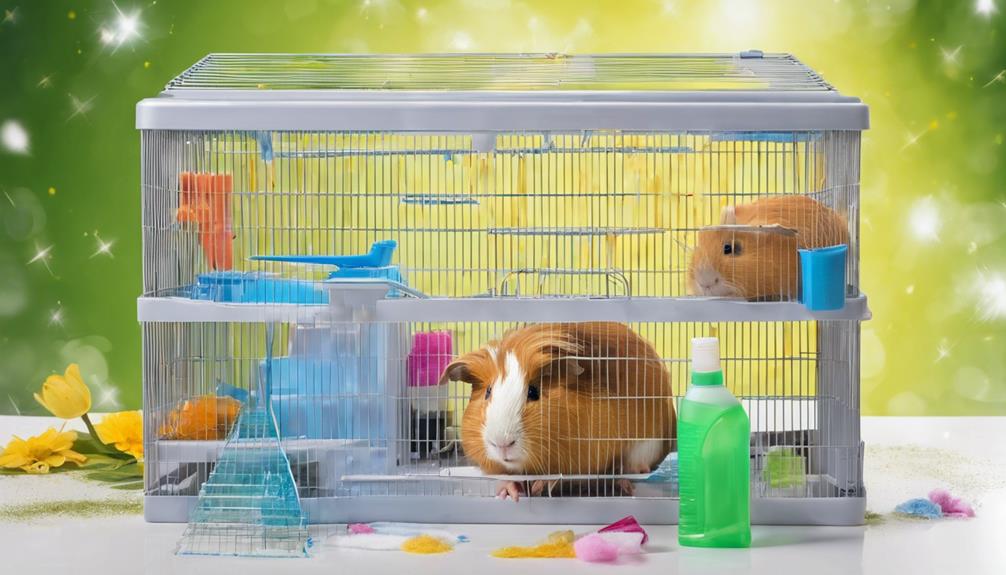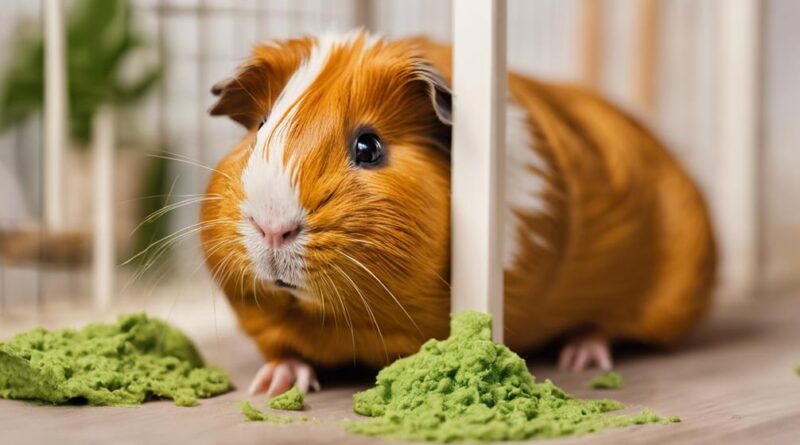Why Choose Non-Toxic Cleaners for Guinea Pig Cages?
You might be thinking that all cleaners are the same, but when it comes to your guinea pig's health, opting for non-toxic options is crucial. Harmful chemicals found in traditional cleaners can have adverse effects on your furry friend.
By choosing non-toxic cleaners for your guinea pig's cage, you are not only protecting their well-being but also creating a safer environment for them to thrive in.
So, what makes non-toxic cleaners the ideal choice for maintaining a clean and healthy guinea pig habitat?
Benefits of Non-Toxic Cleaners
Using non-toxic cleaners for your guinea pig cage can significantly reduce the risk of harmful chemical exposure to your pets. When you opt for non-toxic cleaning solutions, you're choosing the health and well-being of your furry companions. These cleaners offer numerous health benefits, safeguarding your guinea pigs from potential respiratory issues, skin irritations, and other health problems that can arise from exposure to harsh chemicals. By eliminating harmful substances from your cleaning routine, you're creating a safer environment for your pets to thrive in.
In addition to the health benefits, non-toxic cleaners also have a positive environmental impact. Traditional cleaners often contain harsh chemicals that can be detrimental to the environment once they're washed down the drain. By choosing non-toxic alternatives, you're reducing the amount of harmful substances being released into the ecosystem. These eco-friendly cleaners are biodegradable and don't contribute to water or air pollution, ensuring that you're making a responsible choice not only for your guinea pigs but also for the planet.
Common Toxic Ingredients to Avoid
To ensure the safety of your guinea pigs, steer clear of cleaning products containing toxic ingredients. These harmful substances can have detrimental effects on your pets and should be avoided at all costs.
When choosing cleaners for your guinea pig's cage, be mindful of the following toxic ingredients:
- Ammonia: Found in many household cleaners, ammonia can cause respiratory issues and irritation to your guinea pigs' sensitive lungs.
- Bleach: While effective at killing germs, bleach emits strong fumes that can be harmful when inhaled, potentially leading to respiratory problems for your pets.
- Phthalates: Often used as fragrance enhancers, phthalates can disrupt hormone levels and cause long-term health issues in guinea pigs.
- Chlorine: Commonly found in disinfectants, chlorine can be toxic if ingested or inhaled, posing a danger to your guinea pigs' health.
DIY Non-Toxic Cleaning Solutions
For safe and effective cleaning of your guinea pig's cage, consider making your own non-toxic cleaning solutions at home. By using natural ingredients and homemade recipes, you can ensure a clean environment for your pet without exposing them to harmful chemicals.
One simple DIY cleaning solution involves mixing equal parts of water and vinegar. Vinegar is known for its antibacterial properties and can help eliminate odors.
Another effective homemade recipe includes combining water, baking soda, and a few drops of essential oil such as lavender or tea tree oil. Baking soda acts as a gentle abrasive to scrub away grime while the essential oil leaves a pleasant scent.
If you want to tackle tough stains or disinfect the cage, you can create a solution using hydrogen peroxide and water. This mixture can help break down organic matter and sanitize surfaces effectively. Remember to rinse the cage thoroughly after using any cleaning solution to ensure no residue is left behind.
Importance of Ventilation
Proper ventilation in your guinea pig's cage is crucial for maintaining a healthy living environment. Ensuring proper airflow within the cage is essential for your guinea pig's respiratory health. Here are some key points to consider:
- Fresh Air Circulation: Make sure there's adequate ventilation in the cage to allow for the circulation of fresh air. Stagnant air can lead to a buildup of ammonia from urine and feces, which can be harmful to your guinea pig's respiratory system.
- Avoid Drafts: While ventilation is important, it's also crucial to prevent direct drafts of cold air from reaching your guinea pig. Drafts can cause stress and respiratory issues, so find a balance between airflow and draft prevention.
- Proper Cage Placement: Where you position the cage can impact ventilation. Avoid placing the cage in areas with poor air circulation, such as near damp or moldy walls. Opt for well-ventilated spaces in your home instead.
- Regular Cleaning: Keeping the cage clean is vital for maintaining good airflow. A clean cage with fresh bedding helps prevent odors and ensures that your guinea pig is breathing in fresh, clean air.
Safe Cleaning Practices
Maintaining a clean environment for your guinea pig involves using non-toxic cleaners that are safe for your pet's health and well-being. When it comes to safe cleaning practices, ensuring proper ventilation is crucial. Before starting the cleaning process, open windows or set up fans to provide safe ventilation, allowing harmful fumes from cleaning agents to dissipate quickly.
In addition to safe ventilation, using the proper tools is essential for effective and safe cleaning of your guinea pig's cage. Opt for tools like microfiber cloths, sponges, or brushes that are designated for cage cleaning to avoid cross-contamination with other cleaning products that may contain harmful chemicals. These tools are gentle yet effective at removing dirt and grime without the need for harsh chemicals that could be harmful to your pet.
When cleaning your guinea pig's cage, remember to rinse all surfaces thoroughly to ensure no residue of cleaning agents is left behind. This step is crucial in preventing your pet from ingesting any harmful substances that may be present on the cage surfaces. By following these safe cleaning practices, you can maintain a clean and healthy environment for your beloved guinea pig without compromising their well-being.
Commercial Non-Toxic Options
When choosing non-toxic cleaners for your guinea pig's cage, prioritize products specifically designed for pet habitats to ensure your pet's safety and well-being. There are various commercial non-toxic options available that offer eco-friendly alternatives and affordable options for conscientious pet owners like you. These products are crafted with natural ingredients and effective formulas to provide a clean environment for your furry friend.
Here are some key features to look for in commercial non-toxic cleaners:
- Eco-Friendly Alternatives: Opt for products that are environmentally friendly and sustainable, reducing the impact on the planet.
- Affordable Options: Look for cost-effective solutions that fit your budget without compromising on quality or safety.
- Natural Ingredients: Choose cleaners made from natural ingredients such as plant-based extracts or essential oils to avoid harsh chemicals.
- Effective Formulas: Select cleaners that have proven effectiveness in removing odors, stains, and bacteria while being gentle on your guinea pig's sensitive respiratory system.
Cleaning Frequency Guidelines

To ensure a hygienic living space for your guinea pig, establish a consistent schedule for cleaning their cage. A regular cleaning schedule not only benefits your guinea pig's health but also helps in preventing odors and reducing stress for your pet. By adhering to a cleaning routine, you create a clean and comfortable environment that promotes your guinea pig's well-being.
Cleaning frequency guidelines recommend that you spot clean your guinea pig's cage daily. This involves removing any soiled bedding, uneaten food, and droppings. Additionally, you should replace any wet or damp bedding promptly to maintain dryness in the cage. This daily maintenance routine helps in keeping the cage fresh and sanitary.
In addition to daily spot cleaning, a thorough cage cleaning should be done weekly. This involves emptying the cage completely, washing it with a mild detergent, rinsing thoroughly, and allowing it to dry before adding fresh bedding. A weekly deep clean ensures that your guinea pig's living space remains free from bacteria and potential health hazards.
Monitoring Your Guinea Pig's Health
Regularly observing your guinea pig's behavior and physical condition is crucial in monitoring their health. By keeping a close eye on your pet, you can detect any potential issues early on and ensure they receive the appropriate care promptly.
Here are some essential tips to help you monitor your guinea pig's health effectively:
- Behavior: Watch out for any changes in your guinea pig's behavior, such as decreased activity levels, excessive hiding, or sudden aggression.
- Physical Appearance: Check your guinea pig regularly for signs of illness, like discharge from the eyes or nose, overgrown teeth, or lumps and bumps on the body.
- Eating Habits: Monitor your guinea pig's eating habits to ensure they're consuming their food regularly and not showing signs of appetite loss.
- Regular Checkups: Schedule routine checkups with a veterinarian who specializes in exotic pets to ensure your guinea pig is in good health and address any concerns promptly.
Creating a healthy environment for your guinea pig, along with regular monitoring and veterinary care, will help keep your furry friend happy and thriving. Remember, proactive care and observation are key to maintaining your guinea pig's well-being.
Frequently Asked Questions
Are Non-Toxic Cleaners Safe to Use Around Other Pets in the Household?
Non-toxic cleaners are generally safe for other pets in your household. When it comes to pet safety, these cleaners are a better choice compared to harsh chemicals.
They can be used for various household cleaning tasks without posing a risk to your furry companions. For those concerned about the environmental impact, non-toxic cleaners offer chemical-free alternatives that are safer for both your pets and the planet.
Can Non-Toxic Cleaners Effectively Remove Stubborn Stains and Odors From Guinea Pig Cages?
When cleaning your guinea pig's cage, non-toxic cleaners can effectively remove stubborn stains and odors. These cleaners are gentle yet powerful, ensuring a safe environment for your pet.
By choosing non-toxic options, you prioritize stain removal effectiveness while also guaranteeing odor control and safety.
Make sure to follow instructions carefully to maintain a clean and healthy living space for your guinea pig.
How Do Non-Toxic Cleaners Compare in Terms of Cost and Availability to Traditional Cleaning Products?
When comparing non-toxic cleaners to traditional products for cleaning, you'll find that the cost can vary. Non-toxic cleaners may be slightly more expensive initially, but consider the long-term benefits.
Availability might also differ depending on the brand and location. Always check online and in-store options for the best deals.
Cost comparison and availability analysis will help you make an informed decision on which type of cleaner suits your needs best.
Are There Any Specific Non-Toxic Cleaning Brands That Are Recommended for Guinea Pig Owners?
When looking for the best brands of non-toxic cleaners for guinea pig cages, it's essential to prioritize safety. Some recommended brands include Seventh Generation, Mrs. Meyer's Clean Day, and Method.
These products are gentle yet effective for cleaning your pet's living space. Remember to dilute the cleaner according to the instructions and rinse thoroughly to ensure no residue is left behind.
Proper ventilation while cleaning is also crucial for your guinea pig's well-being.
Are There Any Potential Risks or Side Effects Associated With Using Non-Toxic Cleaners for Guinea Pig Cages?
Using non-toxic cleaners for your guinea pig cages can reduce potential risks to your pets' health. These cleaners offer health benefits by avoiding harmful chemicals that could harm your guinea pigs. It's essential to prioritize their well-being and safety, making non-toxic products a smart choice.
Be mindful of any adverse reactions or sensitivities your guinea pigs may have to certain ingredients, and always choose cleaners that are safe for small animals.
Conclusion
So, when it comes to cleaning your guinea pig's cage, always opt for non-toxic cleaners to keep your furry friend safe and healthy.
By avoiding harmful chemicals and using DIY or commercial non-toxic options, you can create a clean environment without putting your guinea pig at risk.
Remember to prioritize ventilation, follow safe cleaning practices, and monitor your guinea pig's health regularly.
Your pet will thank you for making their home a safe and happy place to live in.
